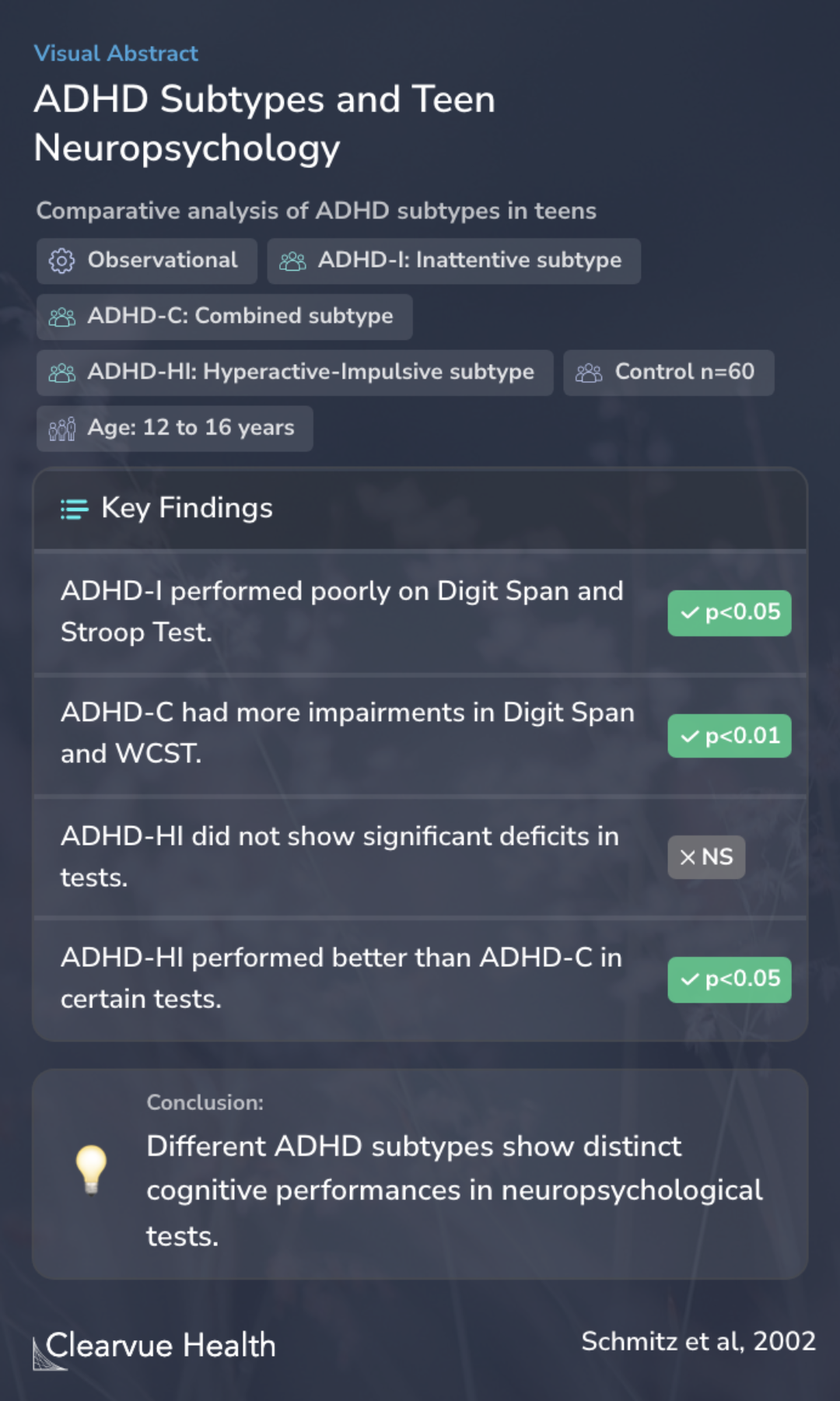Neuropsychological performance in DSM-IV ADHD subtypes: an exploratory study with untreated adolescents
ADHD Subtypes and Teen Neuropsychology
Schmitz M, Cadore L, Paczko M, Kipper L, Chaves M, Rohde LA, Moura C, Knijnik M

Objectives
The study aims to explore the neuropsychological performance of untreated adolescents with attention-deficit hyperactivity disorder (ADHD). This is particularly important as executive function, which includes skills like planning and self-control, is often a challenge for those with ADHD. The focus on adolescents is crucial because ADHD symptoms and subtypes can manifest differently in teens compared to adults.
To explore neuropsychological performance in untreated Brazilian adolescents suffering from attention-deficit hyperactivity disorder (ADHD).
Methods
In the study, 30 adolescents with ADHD and 60 healthy control subjects aged 12 to 16 were assessed. They underwent various neuropsychological tests, including the Wisconsin Card-Sorting Test (WCST), the Stroop Test (ST), the Digit Span, and the Word Span. This comprehensive approach was chosen to gauge the cognitive abilities of these individuals accurately.
We assessed 30 untreated adolescents with ADHD and 60 healthy control subjects, aged 12 to 16 years, using a neuropsychological battery including the Wisconsin Card-Sorting Test (WCST), the Stroop Test (ST), the Digit Span, and the Word Span.
Results
The results highlighted distinct neuropsychological differences among the DSM-IV ADHD subtypes. Teens with the predominantly inattentive subtype (ADHD-I) struggled more with tasks like the Digit Span and the Stroop Test compared to the control group. Those with the combined subtype (ADHD-C) showed more significant impairments in the Digit Span and WCST tests. Interestingly, teens with the predominantly hyperactive-impulsive subtype (ADHD-HI) did not show significant deficits in these tests and even performed better in some areas than those with ADHD-C.
We found neuropsychological differences among the DSM-IV ADHD subtypes. Adolescents with the predominantly inattentive subtype (ADHD-I) performed more poorly than did control subjects on both the Digit Span and the ST. On both the Digit Span and the WCST, adolescents with the combined su...
Conclusions
These findings suggest that different ADHD subtypes have distinct cognitive performances in neuropsychological tests, supporting the diagnostic distinction among them. Notably, adolescents with ADHD-HI do not seem to have significant cognitive deficits, contrasting with the other subtypes. This study contributes to a broader understanding of ADHD, highlighting the need for specific approaches for each subtype.
These findings suggest cognitive differences among ADHD subtypes, supporting the diagnostic distinction among them. Adolescents with ADHD-HI do not seem to have significant cognitive deficits.
Key Takeaways
Context
This study's findings align with other research in the field. For instance, a 2005 meta-analytic review by Willcut et al. explored whether ADHD stems from deficits in executive function. They analyzed 83 studies and found a link between ADHD and executive function deficits, though not consistently enough to explain all ADHD cases.
While adults also can have ADHD, they do face different symptom profiles and potentially different subtypes. A 2009 study by Wilens TE et al. showed that most adults with ADHD had inattentive symptoms, with variations in subtype prevalence and comorbidity.